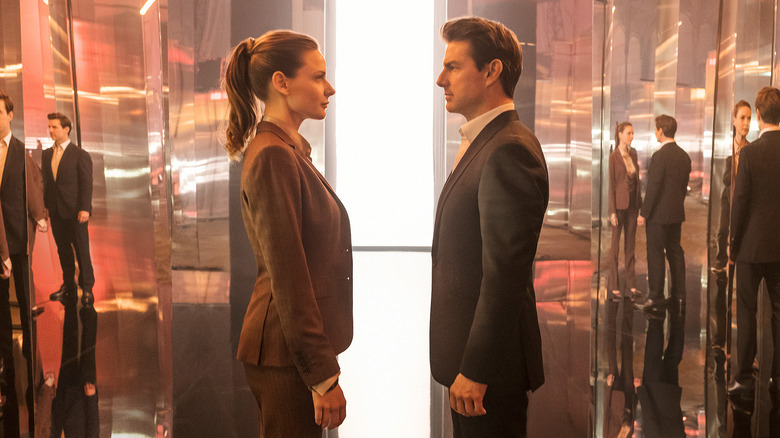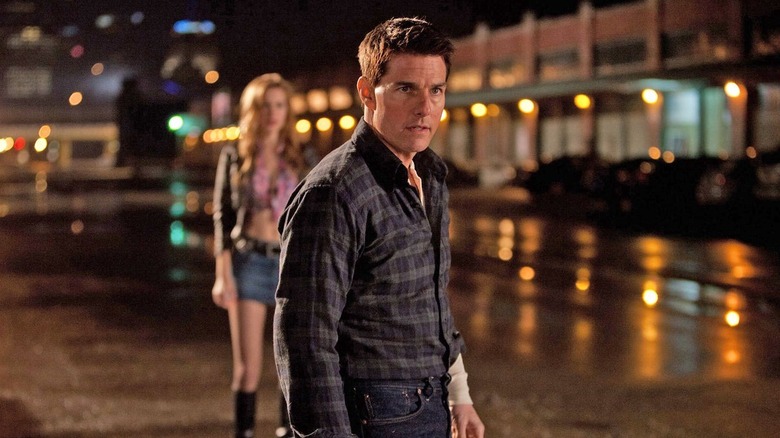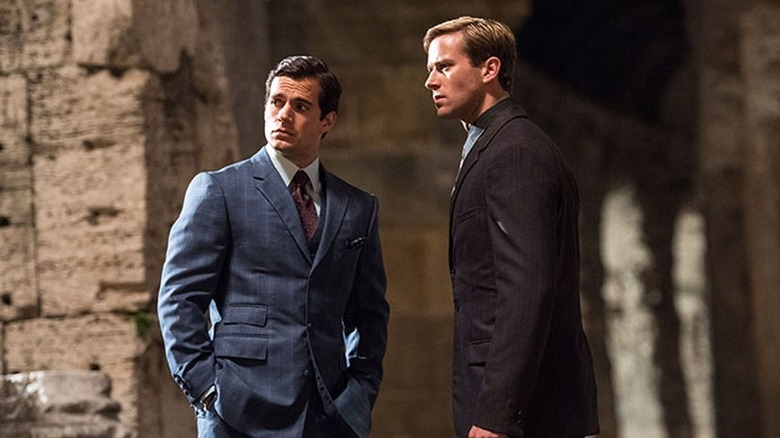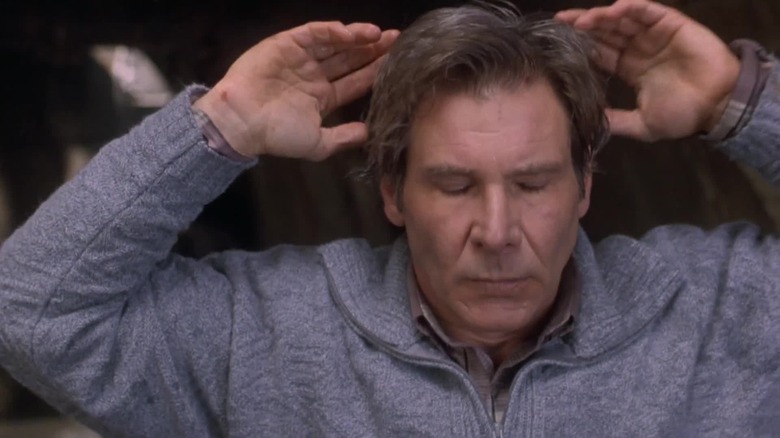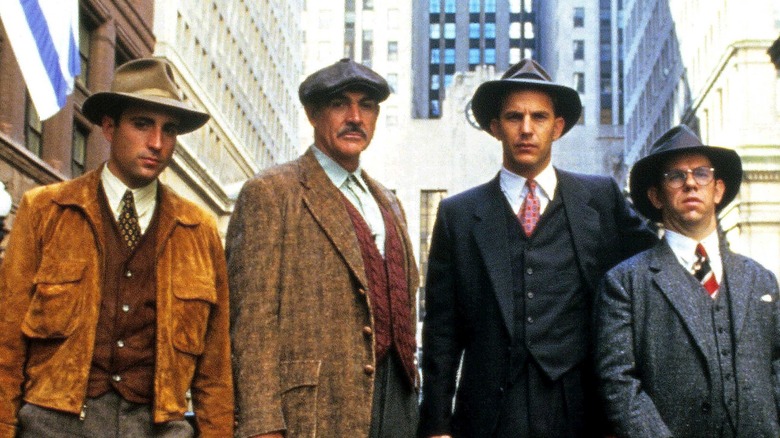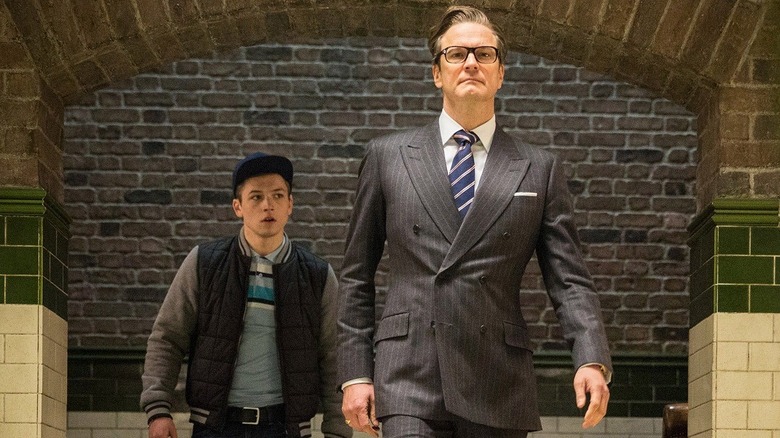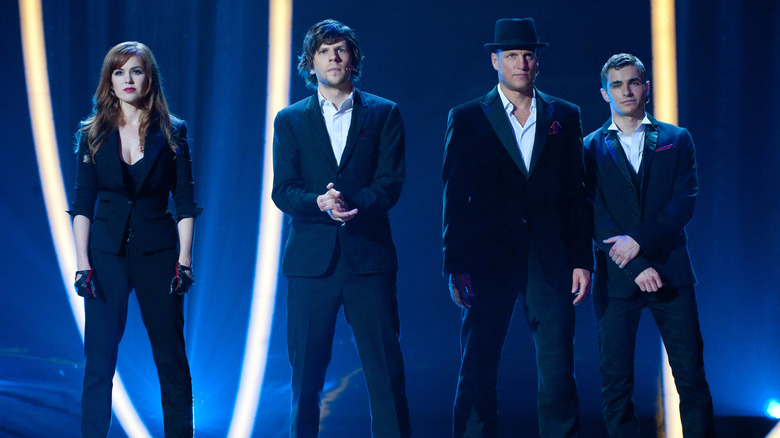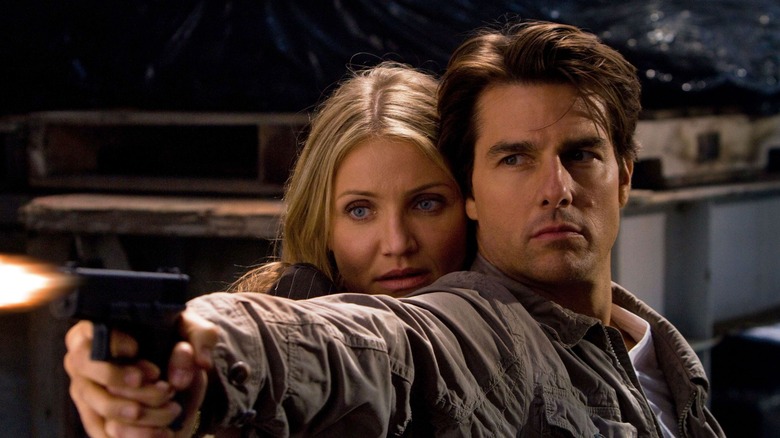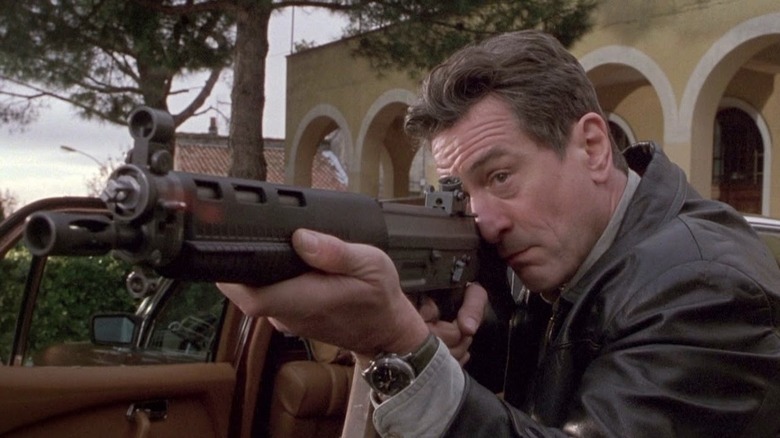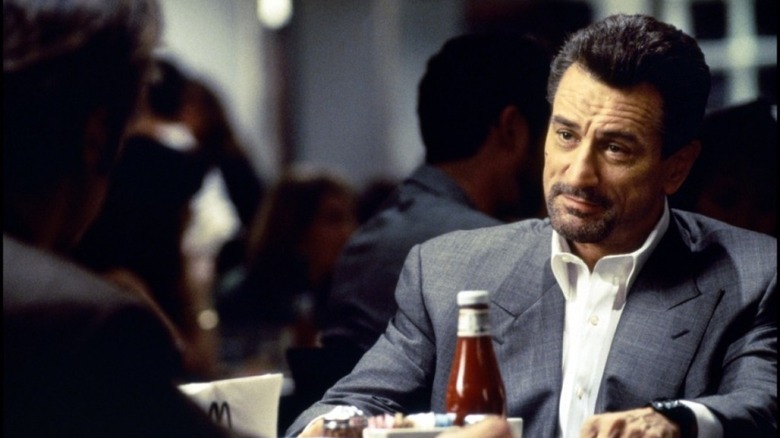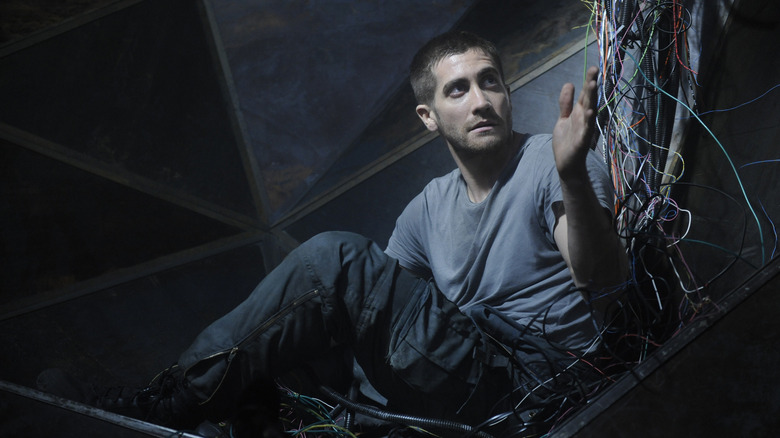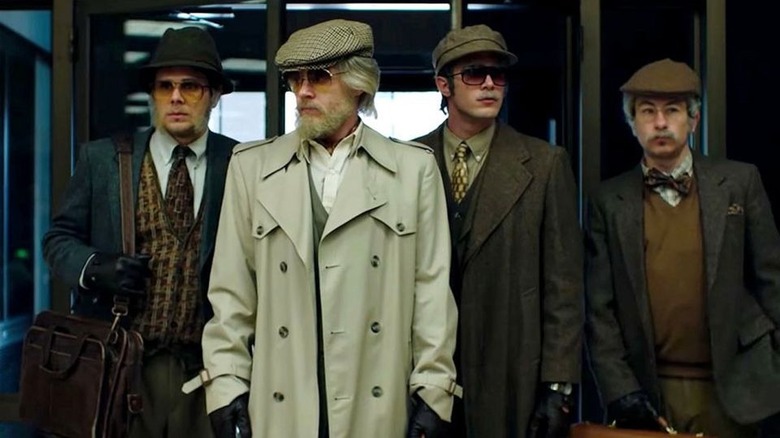Movies Like Mission Impossible That Are Definitely Worth Watching
"Mission: Impossible" has been one of the most consistent movie franchises of the past several decades, and it's amazing to consider that the series is still relevant 25 years after the release of Brian De Palma's original film. While many franchises have fallen flat within their later installments, the "Mission: Impossible" series continues to improve. Ask a big "Mission: Impossible" fan what their favorite installment is, and you could get a variety of acceptable answers.
Based on the classic '60s espionage spy television series, the "Mission: Impossible" films explore the worldwide adventures of Impossible Mission Force (IMF) agent Ethan Hunt, played by Tom Cruise. Cruise is one of the most iconic action stars of all time, but ironically he was better known for his more straightforward dramatic and comedic roles in the '90s. "Mission: Impossible" certainly changed that, establishing Cruise as one of the most charismatic action heroes on the planet, and one that would push his body to extreme limits to pull off the film's exciting stunts.
The "Mission: Impossible" series has remained interesting because of the constant changing of directors. After De Palma expertly wowed audiences with the first film, and stylized action filmmaker John Woo took over for 2000's "Mission: Impossible II." While it was a disappointment, the series has only continued to improve with J.J. Abrams's "Mission: Impossible III," Brad Bird's "Mission: Impossible- Ghost Protocol," and Christopher McQuarrie's "Mission: Impossible- Rogue Nation" and "Mission: Impossible- Fallout."
Love "Mission: Impossible"? Check out these films while we await the arrival of the next one.
Jack Reacher
One of the most interesting aspects of the "Mission: Impossible" franchise is how each filmmaker that takes on the series crafts the direction of the saga in their own image. Unlike other franchises that have become stale because of the same creative voices failing to inject new energy, "Mission: Impossible" employs directors who have different stylistic impulses.
However, the only filmmaker to return for multiple installments has been director Christopher McQuarrie. After delivering one of the best entries with 2015's "Mission: Impossible- Rogue Nation," McQuarrie returned to helm 2018's "Mission: Impossible – Fallout," a film often cited as one of the greatest action films ever made. McQuarrie had an unparalleled mastery of the series, and he is returning to direct this year's "Mission: Impossible 7," as well as "Mission: Impossible 8."
McQuarrie proved himself to be a brilliant auteur of mystery and suspense early within his career with his Academy Award-winning screenplay for "The Usual Suspects." McQuarrie had larger ambitions, and became a frequent screenwriter for Tom Cruise on projects like "Valkyrie" and "Knight and Day." McQuarrie's directorial debut, "The Way of the Gun," was a lower budget project, but before he moved up to the big-budget action series, he showed his understanding of Cruise's star power with the underrated 2012 crime thriller "Jack Reacher," based on the character from Lee Child's novel series. Cruise stars as a military investigator who investigates a series of urban assassinations.
The Man From U.N.C.L.E.
One of the things that some younger fans of the "Mission: Impossible" films may forget is that the action-packed franchise is actually based on a '60s television series that their grandparents may have grown up watching. While the connections between the original show and the current iterations are relatively sparse, and you certainly don't have to have a working knowledge of the original to appreciate the films, many elements are carried over, such as the gadgets, exciting espionage storylines, and of course the amazing theme song. It was a brilliant way to modernize a concept and introduce it to a new audience.
Another recent film inspired by a classic '60s spy series was the 2015 action-comedy "The Man From U.N.C.L.E.," which also took its name from a beloved series of the same name. Guy Ritchie's film took the same central concept of the globetrotting adventures of American secret agent Napoleon Solo and KGB operative Illya Kuryakin, who are forced to work together amidst political tensions between the nations in order to stop threats that span the entire globe, including a syndicate of former Nazi radicals developing evil technology. In the 2015 film, these characters are taken over by Henry Cavill and Armie Hammer, respectively.
The comedic banter between the two is fun, and Ritchie does a great job fleshing out the characters' backstories and providing insights into world politics. Like "Mission: Impossible," the gadgets are wonderfully silly.
The Fugitive
The original 1996 "Mission: Impossible" had the challenge of condensing several seasons of a beloved television show into a singular adventure. The stakes of a television show and a film needed to be different, as a mystery that spans multiple seasons couldn't be told in just two hours. Thankfully, the first film found an interesting way to tell Ethan's story by showing his origin. Ethan is framed for the death of his team within the shocking opening sequence, and he's forced to abandon his status as an IMF agent in order to clear his name.
The stakes against Ethan seem literally impossible, and his journey to redemption in the eyes of his former colleagues gave him a compelling emotional journey throughout the film. Not only is Ethan devastated by losing his friends, but he wants to regain his old life by clearing his name. It's a concept that was also utilized in the 1993 action classic "The Fugitive," which was similarly inspired by a beloved original television show from the 1960s.
The original series followed Chicago surgeon Dr. Richard Kimbel, who finds that his wife has been murdered and is subsequently accused of her murder. Kimbel manages to escape prison and goes out on his own to search for the real culprit. Harrison Ford took over the role in the film, and Tommy Lee Jones won the Academy Award for best supporting actor for his memorable performance as U.S. Marshal Sam Gerard, who realizes Kimbel's innocence.
The Untouchables
Each of the "Mission: Impossible" directors have done something interesting and original with the series, but none of the series' current success would be possible if it wasn't for what Brian De Palma did with the 1996 original. Not only did De Palma lay the groundwork for Ethan's origin and introduce characters like Ving Rhames's Luther Stickell (who would go on to appear throughout the franchise), but he set the precedent for the saga's exciting action setpieces. However, compared to the other films within the series, De Palma's film puts more emphasis on suspense and intrigue than it does on spectacle. Even when some '90s action films have shown their age due to the dated special effects, "Mission: Impossible" still holds up because of the great filmmaking.
Combining pulpy noir elements with Hitchcockian mystery is something that De Palma has done throughout his career, and it's hard to categorize any of his films as straight dramas, thrillers, mysteries, or action summer blockbusters. Nearly a decade prior to "Mission: Impossible," De Palma adapted another iconic television series with the 1987 film "The Untouchables." Based on a true story, the film follows the efforts of Chicago cops Elliot Ness (Kevin Costner), Jim Malone (Sean Connery), George Stone (Andy Garcia), and Oscar Wallace (Charles Martin Smith) as they attempt to track down the infamous gangster Al Capone (Robert De Niro). Like "Mission: Impossible," De Palma explores the team dynamic as men with different skill sets work together amidst frantic action sequences.
Top Gun
It's ironic to ever think of Tom Cruise as anything but the most ambitious action star on the planet, but surprisingly Cruise began his career as more of a teenage heartthrob than an action hero. Throughout his early career and even concurrently to the "Mission: Impossible" series, Cruise has worked with some of the most extraordinary directors in the industry, including Steven Spielberg, Martin Scorsese, Stanley Kubrick, Paul Thomas Anderson, Michael Mann, Ron Howard, Ridley Scott, Oliver Stone, Cameron Crowe, James Mangold, Francis Ford Coppola, and Rob Reiner. Perhaps the prospect of working with Brian De Palma was more intriguing to him in the first "Mission: Impossible" than the idea of being the recurring lead of a major tentpole franchise.
Despite his ambitions of working with talented filmmakers and pursuing challenging roles, Cruise had never failed to convince audiences that he's not the coolest movie star on the planet. With a unique charisma that's not exclusive to the character of Ethan Hunt, Cruise is one of the rare "movie stars" that can still sell a film on his name alone in an era where characters and properties seem more important than actors. This worldwide dominance has spanned multiple decades, and it began back in 1986 thanks to the record-breaking success of "Top Gun."
"Top Gun" doesn't work without Cruise, who perfectly captured the mix of comedy, drama, satire, and stunt work needed to embody U.S. military pilot "Maverick," who returns this year in "Top Gun: Maverick."
Kingsman: The Secret Service
The "Mission: Impossible" series has remained relevant for 25 years thanks to its adaptability to the changing times and expectations of the era. The villains of each installment are uniquely suited to the ways in which the world has changed and the current political state, and each film has done a great job at incorporating current pop culture trends. The "Mission: Impossible" films hold a unique place among major spy franchises; spy films grew darker in the early 21st Century due to the success of the rebooted James Bond series and the "Bourne" films. While "Mission: Impossible" certainly has high stakes and compelling drama, the films are still very fun and contain a lot of humor, including quips between characters as they note the incredulous circumstances they find themselves in.
Not all spy movie fans enjoy the darker aspects, and Matthew Vaughn's 2015 film "Kingsman: The Secret Service" adapted to the changing expectations by lampooning the current landscape. With frequent references to Bond, Bourne, and "Mission: Impossible," the self-aware action film was a throwback to a lighter era of espionage cinema. However, despite the high number of gags, "Kingsman" isn't just a parody like "Austin Powers." Vaughn crafts set pieces that are shocking in their brutality.
The film follows a secret British intelligence agency that directly serves the Royal Crown, and follows the training of the new recruit Eggsy (Taron Egerton) under the experienced field agent Harry Hart (Colin Firth). It was followed by "Kingsman: The Golden Circle."
Now You See Me
One of the best aspects of the "Mission: Impossible" series is the team dynamic. Obviously, Tom Cruise is the major draw for the series and no one doubts Ethan Hunt's prominence, but each film pairs Ethan with a new band of allies who each have their own skills and personalities. Hunt's original team is killed off at the beginning of the first film, so each new installment introduces additional companions for him. However, characters like Ving Rhames's Luther Stickell, Jeremy Renner's William Brandt, Simon Pegg's Benjamin Dunn, and Rebecca Ferguson's Ilsa Faust have returned for multiple installments.
Not only does each heist require multiple moving parts that necessitate team members with different abilities, but the humor and banter between characters make the stories more entertaining. It also adds to the stakes, as audiences care about the fates of each of the characters when they are put in danger. A great ensemble cast is necessary for a heist film, and the 2013 film "Now You See Me" took a new twist on the genre by following a series of activist magicians who expose corrupt corporate businessmen.
The illusionists Danny Atlas (Jesse Eisenberg), Merrit McKinney (Woody Harrelson), Jack Wilder (Dave Franco), and Henley Reeves (Ilsa Fisher) work under a mysterious organization called "The Eye" as they are pursued by FBI Agent Dylan Rhodes (Mark Ruffalo). If the "Mission: Impossible" films are known for their complex storylines, "Now You See Me" certainly matches it with a shocking plot twist.
Knight and Day
Outside of the "Mission: Impossible" franchise, Tom Cruise has frequently starred in action films that take a more elevated approach to the genre. Projects like "Minority Report, "Collateral," "War of the Worlds," "Edge of Tomorrow," "The Last Samurai," and "American Made" show Cruise in more dramatic roles as his characters go through challenging situations. What's unique about the "Mission: Impossible" films is that despite the hardships that Ethan goes through as he attempts to balance saving the world, protecting his team, and having a functional marriage, the stories are still a lot of fun.
Cruise takes his commitment to incredible stunts very seriously, but he is certainly self-aware. The 2010 espionage film "Knight and Day" showed Cruise poking fun at his familiar image with a semi-parodical storyline. James Mangold's film follows Cruise as the rogue assassin Roy Miller, who joins forces with June Haven (Cameron Diaz) as he looks to clear his name and locate a mysterious device developed by the insane evil scientist John Fitzgerald (Peter Sarsgaard). Like Hunt, Miller is considered to be highly dangerous and is framed by his own intelligence agency as he attempts to save the world.
Miller is a more over-the-top version of Hunt, and Cruise acknowledges his reputation for having eccentricities with a very quirky character. The banter between Haven and Miller adds humor and romance to the story.
Ronin
Great heist films require a compelling ensemble of characters that each bring their own skill sets and abilities to the story. A heist film requires a combination of action and problem-solving; it's not interesting if the characters are just shooting at each other the entire time, as they also need to use their minds to develop strategies to pull off tasks that seem "impossible." The incorporation of heist elements is part of the reason that the "Mission: Impossible" films are so unique among the currently running action franchises, as they're much more intelligent and require the viewer to pay attention to plot details.
The 1998 film "Ronin" tells a similar heist storyline about an eclectic group of field agents who team up to stop a world-threatening villain. The film follows American mercenary Sam Regazolli (Robert De Niro), French gunman Vincent (Jean Reno), IRA operative Deidre (Natascha McElhone), English SAS agent Spence (Sean Bean), former KGB agent Gregor (Stellan Skarsgard), and getaway driver Larry (Skipp Sudduth) as they are recruited to rob a heavily guarded vehicle in order to uncover a mysterious briefcase. The "Mission: Impossible" films are exciting because of their diverse casts, and "Ronin" has interesting character dynamics thanks to the international characters who are forced to question each others' loyalties. It added a sense of mystery to a story that already features many thrilling set-pieces throughout Europe. Director John Frankenheimer is experienced with spy thrillers and creates an elevated popcorn adventure.
Heat
Similar to the James Bond films, the "Mission: Impossible" franchise introduces new villains in each installment. While the early villains were not standouts, "Mission: Impossible III" raised the expectations with the introduction of Owen Davian (Philip Seymour Hoffman), a rogue arms dealer that kidnaps Hunt's wife. Sean Harris's character Solomon Lane, a former MI6 agent who is hell-bent on nuclear devastation, didn't leave a huge impression when he debuted in 2015's "Mission: Impossible – Rogue Nation," but he was fleshed out much more when he returned for 2018's "Mission: Impossible – Fallout."
Lane was an interesting character because he had many parallels to Hunt; both men were shaped by their experiences in MI6, yet Lane grew disenfranchised with the agency's goals and turned towards terrorism. The confrontations highlight the similarities between the two, and 1995's "Heat" is one of the greatest action crime films of all time because the audience is equally invested in both the hero and villain. LAPD Lieutenant Vincent Hanna (Al Pacino) is tasked with capturing bank robber Neil McCauley (Robert De Niro), but in the film's iconic diner scene, realizes that he and his archnemesis aren't so different.
Source Code
The ending of the first "Mission: Impossible" film follows Ethan as he attempts to stop the villain Max (Vanessa Redgrave) during a secret exchange of classified information on a TGV train to Paris. It's one of the longer set pieces within the "Mission: Impossible" franchise, but the contained environment makes the tension extremely palpable. Ethan doesn't want to risk the safety of the passengers or the leaking of information, but he also needs to stop Max from unleashing devastation.
The contained environment of the train was a unique set up for an action and mystery film, and it's something that's also adopted in the 2011 science fiction thriller "Source Code." The film follows former U.S. Army Captain Colter Stevens (Jake Gyllenhaal) as he wakes up on a commuter trip to Chicago and doesn't recognize where or who he is. Stevens realizes he's part of a repeated simulation used by the government to examine the scene of a crime. A bomb detonated on the train earlier in the day, and Stevens needs to find the culprit before they strike again.
American Animals
Morality is pivotal within the "Mission: Impossible" films, as Ethan is forced to make hard choices as he attempts to save the world. Sometimes his missions require him to give weapons or information to untrustworthy characters, and he must choose if the risks are worth the potential lives saved. The 2018 heist thriller "American Animals" took a similarly layered approach to the heist thriller genre with its interesting mix of fact and fiction.
The film follows the true story of Transylvania University students Warren Lipka (Evan Peters), Spencer Reinhard (Barry Keoughan), Chas Allen III (Blake Jenner), and Eric Borsuk (Jared Abrahamson), who rob their school's library in order to steal a rare book and sell it on the black market. Interspersed with the recreations are actual interviews with the real men who look back on their shameful youthful experiences. They were motivated by boredom, but Reinhard in particular lives under the anxiety of a moment of violence that left him traumatized.
